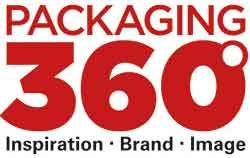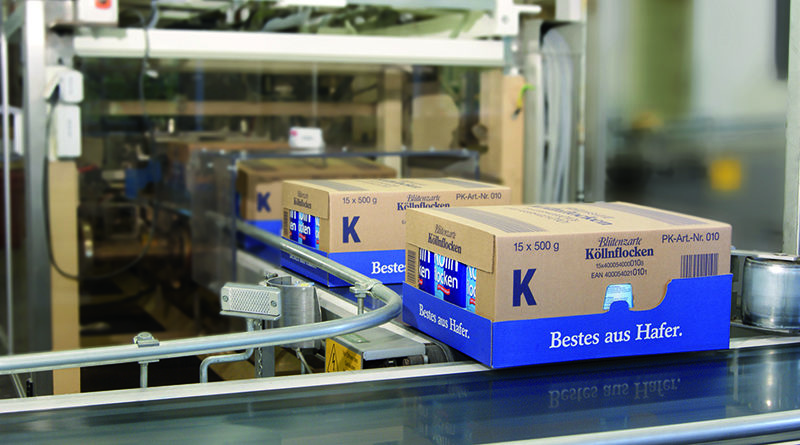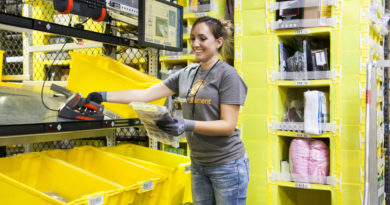Packaging Industry Demands Systemic Relevance
Corrugated board factories are working at full speed throughout Europe. The industry is still able to satisfy the increasing demand caused by the corona crisis, but fears that production will be disrupted by restrictions on the cross-border movement of goods. Leading associations are therefore calling for the packaging industry to be recognised as a systemically important sector.
„Systemic relevance“ is likely to be a safe candidate for the election of the word of the year 2020. Systemic relevance is what belongs to the country’s „critical infrastructure“, i.e. that which is indispensable. The entire food industry is systemically relevant, emphasized Federal Minister of Nutrition Julia Klöckner a few days ago, naming agriculture, warehousemen and transporters as well as food production and trade. The packaging industry was not mentioned in the speech.
However, transport and sales packaging is what makes it possible for food and pharmaceutical products to reach the end consumer hygienically and effectively. „Systemically relevant“ is, the industry associations of the packaging industry emphasize, not only the packaging itself but also the unhindered delivery of the corresponding raw materials.
Food industry is the most important buyer of corrugated cardboard
People are currently buying more than usual in grocery retailing, while the number of orders in online trading is also increasing – both core customers of the packaging industry. The production in the Austrian corrugated cardboard plants is therefore running at full speed, reports Forum Wellpappe Austria. The German Association of the Corrugated Cardboard Industry (VDW) also considers the food and beverage industry to be the most important customer group with a 30 percent share of sales.
The raw materials and intermediate products for the production of packaging are mainly paper and cardboard, plastics and adhesives as well as printing inks and varnishes used for printing on packaging. In a survey conducted by the European Economic Service EUWID at the end of last week, European packaging manufacturers showed that they are still well supplied with raw materials. But there is growing concern in the industry about supply shortages due to border closures and controls to contain the spread of Covid-19. More and more reports are coming in from Italian companies about difficulties in sending and receiving goods.
Solvents for printing inks could become scarce
Important printing and cleaning chemicals are also threatened by shortages due to changes in consumer behavior. The supply of packaging manufacturers with solvent products is endangered by the exorbitant increase in demand for disinfectants, which are based on the same raw materials as certain printing inks and auxiliaries.
The paper and board packaging sector is currently trying to obtain a Europe-wide clarification that companies involved in the supply of raw materials and converters producing packaging for systemically important goods are exempted from restrictions imposed in response to the Covid-19 outbreak.
At the end of last week, the European Carton Makers Association (ECMA) and Pro Carton, the European association of the cartonboard and folding carton industry, had already issued a joint statement in which they pointed out the need for open transport routes for raw materials for the manufacture of packaging as well as for the supply of packaging. Border closures could lead to packaging manufacturers having to reduce or even shut down their production, which would result in a significant disruption of the food and pharmaceutical supply chain. FEFCO, the European Federation of the Corrugated Board Industry in Brussels, also appealed to governments not to close borders for freight transport.
„An integral part of securing supplies for the population“
Yesterday, a dozen associations representing the German packaging industry wrote to the federal ministers and responsible state secretaries of various ministries to point out the dangers for the supply chain for food and pharmaceutical products.
The paper, which is signed not only by the VDW but also by the Folding Carton Industry Association (FFI) and the Association of Manufacturers of Self-adhesive Labels and Narrow Web Converters (VskE), contains concrete requirements: Transport and sales packaging and its raw materials as well as preliminary products for food and pharmaceutical products are to be classified as „integral and systemically relevant products in connection with measures to contain the corona pandemic“ or „critical services“ within the scope of § 4 „Sector Nutrition“ and § 6 „Sector Health“ of the Ordinance on the Provision for the Determination of Critical Infrastructures in accordance with the BSI Act.
„The supply chains for transport and sales packaging and their raw materials and intermediate products for food and pharmaceutical products must be protected and exempted from the restrictions associated with measures relating to the cross-border movement of goods,“ the paper states. At national borders, appropriate measures should be established for the priority handling of such products („Priority/Green Lanes“).
Last week, the European Commission had presented guidelines on internal border controls in the wake of the Corona crisis, calling for the creation of priority lanes for freight traffic to ensure the free flow of medicines, food and other goods.
Security for logistics companies demanded
The packaging associations are also calling on politicians to give the transport industry assurances that drivers will be allowed to return to their starting point in any case. Because of delays at the borders, some logistics companies have already refused cross-border orders. Employees of logistics companies already refused to drive to areas with high restrictions – for fear of being quarantined there and not being allowed to return.
The systemic relevance demanded by the packaging industry also affects possible plant closures by superordinate authorities, which are currently already being ordered in some countries. Industries that are considered to be systemically relevant are excluded from this. The associations also demand exemptions for employees of manufacturers and suppliers of transport and sales packaging for food and pharmaceutical products in the case of curfews. „After the safety and health of the employees, the ability to deliver has the highest priority,“ says Dr. Oliver Wolfrum, Managing Director of the German Corrugated Cardboard Industry Association (VDW).




